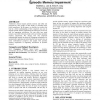Free Online Productivity Tools
i2Speak
i2Symbol
i2OCR
iTex2Img
iWeb2Print
iWeb2Shot
i2Type
iPdf2Split
iPdf2Merge
i2Bopomofo
i2Arabic
i2Style
i2Image
i2PDF
iLatex2Rtf
Sci2ools
ASSETS
2007
ACM
2007
ACM
Providing good memory cues for people with episodic memory impairment
Alzheimer's disease impairs episodic memory and subtly and progressively robs people of their ability to remember their recent experiences. In this paper, we describe two studies that lead to a better understanding of how caregivers use cues to support episodic memory impairment and what types of cues are best for supporting recollection. We also show how good memory cues differ between people with and without episodic memory impairment. We discuss how this improved understanding impacts the design of lifelogging technologies for automatically capturing and extracting the best memory cues to assist overburdened caregivers and people with episodic memory impairment in supporting recollection of episodic memory. Categories and Subject Descriptors K.4.2 [Computers Milieux]: Social Issues
| Added | 12 Aug 2010 |
| Updated | 12 Aug 2010 |
| Type | Conference |
| Year | 2007 |
| Where | ASSETS |
| Authors | Matthew L. Lee, Anind K. Dey |
Comments (0)

